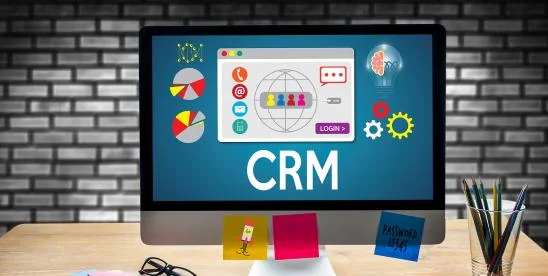ROI of a Website in 2025 Introduction: Why Website ROI Is Crucial in 2025 Your […]
Red flags you need CRM

 Red Flags That Show You Need a CRM
Red Flags That Show You Need a CRM
Running a business without the right tools is like trying to win a race with one hand tied behind your back. Many companies still rely on outdated methods like spreadsheets, emails, or paper notes to track leads and manage customers. While this may work temporarily, as your business grows, these systems quickly become messy, unreliable, and time-consuming. The result? Lost opportunities, frustrated employees, and unsatisfied customers.
A Customer Relationship Management (CRM) system is no longer just a nice-to-have; it’s a necessity for businesses that want to thrive in a competitive market. If you’re unsure whether your business really needs one, here are some warning signs you should never ignore.
 Losing Track of Leads and Opportunities
Losing Track of Leads and Opportunities
One of the biggest challenges businesses face is keeping track of leads as they move through the sales funnel. Without a clear process, it becomes nearly impossible to know which prospects are ready to buy and which still need nurturing. You may find yourself wondering, “Did someone from my team already contact this lead?” or “What happened to the potential client we spoke to last month?”
A CRM solves this problem by storing every lead’s information, tracking interactions, and giving sales teams a real-time view of where each opportunity stands. Instead of chasing after scattered notes or depending on memory, your team can work confidently knowing that every lead is accounted for and properly followed up on. This not only improves efficiency but also increases the chances of closing deals successfully.

If your customer data lives in multiple locations—emails, WhatsApp chats, spreadsheets, or even personal phones—you’re dealing with a ticking time bomb. When employees waste time hunting for information or worse, lose critical customer details, service quality drops dramatically.
With a CRM, all customer data is stored in one centralized system that everyone on the team can access. Whether it’s a customer’s purchase history, communication preferences, or service requests, everything is neatly organized and readily available. This not only saves time but also ensures that no matter who interacts with the customer, the experience is consistent and professional.

Have you ever lost a sale because no one followed up on time? It happens more often than businesses realize. A prospect who seemed interested last week may forget about you entirely if you don’t reach out promptly. Missing follow-ups signals a lack of professionalism and makes customers feel undervalued.
A CRM eliminates this issue by automating reminders and scheduling follow-ups. You’ll receive notifications about when to call, email, or meet a client, ensuring no opportunity slips through the cracks. Over time, this consistency builds trust with customers, showing them that you are attentive and reliable.

If you’re unsure about how many deals are in progress, what stage they’re at, or how much revenue is expected this quarter, then you’re running your sales pipeline blind. This lack of visibility makes forecasting difficult and prevents managers from making informed decisions.
CRMs give you a crystal-clear view of your pipeline through visual dashboards and reports. You can instantly see which deals are moving forward, which are stuck, and where your team should focus their energy. With this insight, your business can allocate resources wisely, identify bottlenecks, and increase overall sales productivity.

Customer complaints are a natural part of doing business, but if they’re becoming frequent and repetitive, it’s a sign of deeper issues. Often, complaints arise when customers feel like they’re repeating themselves or when the support team doesn’t have enough information about past interactions.
A CRM keeps a detailed history of every customer touchpoint—from emails and calls to service requests and purchases. This means that when a customer contacts you, your team can instantly access their entire journey and respond with knowledge and empathy. Resolving issues faster and more effectively not only reduces complaints but also strengthens customer loyalty.

If preparing a sales report or performance report feels like pulling teeth—gathering data from multiple spreadsheets, cleaning it, and building charts—you’re wasting time and risking inaccuracies. Manual reporting often leads to delays in decision-making and missed opportunities.
With a CRM, reports are generated in seconds. Sales managers can see real-time numbers on revenue, lead conversion rates, customer acquisition costs, and more. This allows leaders to make data-driven decisions quickly and adjust strategies without waiting weeks for manual reports.

A common pain point in growing businesses is poor communication between departments. Sales, marketing, and customer support often work in silos, with each team having its own version of the truth. This lack of collaboration leads to mixed messages, slower service, and frustrated customers.
A CRM bridges this gap by providing a single platform where all teams can access the same data. Marketing knows which leads are being pursued by sales, sales knows which campaigns brought in leads, and support has access to the customer’s full history. This alignment creates a seamless experience for customers while making internal teamwork more efficient.

Do you know why your customers buy from you—or why they leave? Without detailed insights, businesses end up making assumptions rather than decisions based on facts. This often results in poor targeting, irrelevant offers, and weak customer retention.
A CRM provides a complete 360-degree view of each customer, including buying patterns, preferences, and engagement history. This data helps your business personalize interactions, anticipate customer needs, and design better products or services. The more you understand your customers, the easier it becomes to keep them coming back.

Running marketing campaigns without proper tracking is like throwing darts in the dark. You might hit the target occasionally, but most efforts will miss. Without knowing which campaigns generate quality leads or how customers are responding, marketing budgets often go to waste.
CRM systems allow businesses to connect campaigns directly to sales outcomes. You can measure how many leads came from an ad, how many converted into customers, and which channels bring the highest return on investment. This clarity empowers businesses to focus on what works and cut down on ineffective strategies.

If your business growth has stalled, manual processes could be the culprit. What worked for 50 customers may not work for 500. Spreadsheets and emails can’t keep up with scale, and eventually, inefficiency starts to drag down progress.
A CRM grows alongside your business, helping you handle larger volumes of data, more customer interactions, and bigger teams without sacrificing quality. By automating repetitive tasks and streamlining workflows, CRMs free up your team to focus on strategy, innovation, and customer engagement.
 The Takeaway
The Takeaway
If any of these red flags feel familiar, it’s a clear sign that your business is ready for a CRM. The sooner you make the shift, the sooner you’ll notice improvements in efficiency, customer satisfaction, and revenue growth.
At Spark ITX, we specialize in implementing customized CRM solutions that fit your business model, whether you’re a startup, SME, or growing enterprise. With the right CRM, you’ll not only gain better control over your customer relationships but also unlock new opportunities for long-term success.
 Ready to stop missing opportunities and start scaling with confidence? Let’s connect today.
Ready to stop missing opportunities and start scaling with confidence? Let’s connect today.
Related Posts
Why Tamil Nadu Retailers Are Going Online
- SparkITX
- August 21, 2025
- 6 min read
- 0
Why Tamil Nadu Retailers Are Going Online Discover why Tamil Nadu retailers are rapidly going […]
E-Commerce Boost for SMEs
- SparkITX
- August 13, 2025
- 3 min read
- 0
E-Commerce Boost for SMEs 2025 Strategies to Grow Smart Introduction In a digital-first era where […]
Why ERP is Essential for Industries
- SparkITX
- January 17, 2025
- 9 min read
- 0
Why ERP is Essential for Industries In today’s fast-evolving business landscape, industries face intense competition, […]




